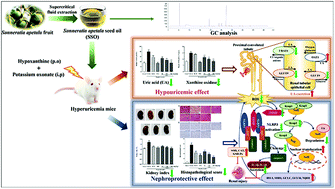Sonneratia apetala seed oil attenuates potassium oxonate/hypoxanthine-induced hyperuricemia and renal injury in mice†
Abstract
Sonneratia apetala seeds are considered as prospective nutraceuticals with a high content of unsaturated fatty acids (UFAs) which are mainly distributed in the oil. It is well-known that UFAs could exhibit urate-lowering potency and protect against renal injury, indicating that S. apetala seed oil (SSO) may possess hypouricemic and nephroprotective effects. Consequently, the present work attempted to probe into the effects and mechanisms of SSO on potassium oxonate/hypoxanthine-induced hyperuricemia and associated renal injury. The results indicated that SSO treatment prominently inhibited the increase of serum uric acid (UA), creatinine (CRE), and urea nitrogen (BUN) levels and hepatic xanthine oxidase (XOD) activity in hyperuricemia mice. Kidney indexes and histopathological lesions were also remarkably ameliorated. Additionally, SSO treatment improved the renal anti-oxidant status in hyperuricemia mice by significantly reversing the increase in ROS and MDA levels as well as the decline in SOD, CAT and GSH-Px activities. SSO dramatically downregulated the expression and secretion of pro-inflammatory factors involving MCP-1, IL-1β, IL-6, IL-18 and TNF-α elicited by hyperuricemia. Furthermore, after SSO treatment, increased protein expressions of GLUT9, URAT1 and OAT1 in the hyperuricemia mice were obviously reversed. SSO treatment enormously restored Nrf2 activation and subsequent translation of related anti-oxidative enzymes in the kidneys. TXNIP/NLRP3 inflammasome activation was also obviously suppressed by SSO. In conclusion, SSO exerted favorable hypouricemic effects owing to its dual functions of downregulating the XOD activity and modulating the expressions of renal urate transport-associated proteins, and it also could alleviate hyperuricemia-induced renal injury by restoring the Keap1-Nrf2 pathway and blocking the TXNIP/NLRP3 inflammasome activation.



 Please wait while we load your content...
Please wait while we load your content...